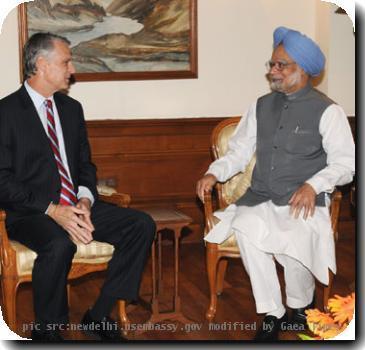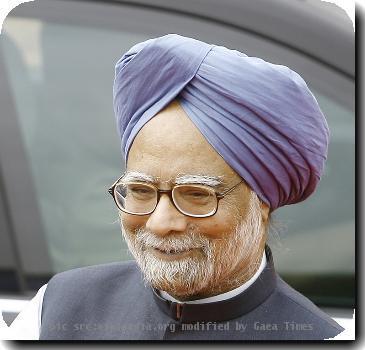India backs IAEA vote against Iran, but opposes sanctions
By Manish Chand, IANSFriday, November 27, 2009
PORT OF SPAIN/VIENNA - For the third time in the last five years, India Friday backed an international resolution against Iran over its nuclear programme, but qualified it by saying it is opposed to “a renewed punitive approach or sanctions” and stressed the need for “keeping doors open for dialogue”.
In a formal explanation justifying India’s vote for the resolution, passed by a 25-3 margin at the International Atomic Energy Agency’s 35-member board’s meeting in Vienna, India’s external affairs ministry said the adoption of this resolution should not “divert the parties away from dialogue”.
“This resolution cannot be the basis of a renewed punitive approach or new sanctions,” the ministry stressed.
The resolution, which was endorsed by six world powers - the US, Russia, China, Britain, France and Germany - appeared to signal possible support for any new Western push for a fourth set of UN sanctions in case of Iran continuing its defiance over its nuclear programme, which the West suspects to be for developing atomic bombs.
“In fact, the coming weeks should be used by all concerned to expand the diplomatic space to satisfactorily address all outstanding issues,” the ministry said.
India firmly supports keeping the door open for dialogue and avoidance of confrontation, it stressed.
India’s vote against the Iranian nuclear programme comes barely two weeks after Iranian Foreign Minister Manouchehr Mottaki met Prime Minister Manmohan Singh and External Affairs Minister S.M. Krishna in New Delhi. India had voted against Tehran first in 2005 and then again in 2006, putting its ties with the oil-rich country under stress.
India has made it clear many a time that it does not favour another nuclear weapon state in its neighbourhood and favoured dialogue and diplomacy to resolve the issue of the Iranian nuclear programme.
The latest IAEA resolution, based on a critical report by its outgoing Director-General Mohamed ElBaradei, which was also backed by Russia, demanded that Tehran freeze the uranium enrichment facility at Qom immediately.
Under international pressure, Iran had finally revealed its new facility in Qom only in September, leading first to outrage and then a renewed effort by the five permanent members of the UN Security Council and Germany to engage Tehran to give up its enrichment plan.
Prime Minister Manmohan Singh is currently in the Trinidadian capital to attend the 53-nation Commonwealth summit.
India’s response to the IAEA vote was formulated after discussions between External Affairs Minister S.M. Krishna, Foreign Secretary Nirupama Rao and senior officials of the external affairs ministry who are accompanying the prime minister to Trinidad.
In its explanation, New Delhi said that its support for the resolution was based on key points in the IAEA DG’s report. “The conclusions he has drawn in his report are therefore difficult to ignore,” the ministry said.
The Iranian nuclear crisis will also figure in Manmohan Singh’s discussions with British Prime Minister Gordon Brown and French President Nicolas Sarkozy on the sidelines of the Commonwealth summit.
In a criticism of Iran, India said that the IAEA’s safeguards system is “the bedrock of the international community’s confidence that peaceful uses of nuclear energy and non-proliferation objectives can be pursued in a balanced manner.” “The integrity of this system should be preserved,” it added.
“In Iran’s case which is a signatory to the Nuclear Non-Proliferation Treaty (NPT), it has all the rights and obligations that go with its membership of the NPT pertaining to the use of nuclear energy for peaceful purposes,” the ministry said.
“We also underline the importance of the full and effective implementation of all safeguards obligations under taken by member states of the IAEA,” it added.
Two days ago in Washington, Manmohan Singh has said India supported the engagement between Tehran and the five permanent members (P5) of the Security Council over the nuclear standoff, but reiterated that India did not support Iranian nuclear ambitions.
“We would welcome an engagement between Iran and the P5,” he had said.

